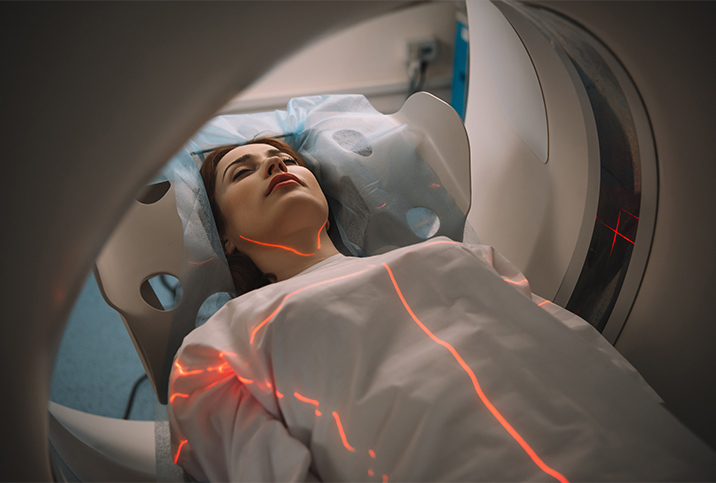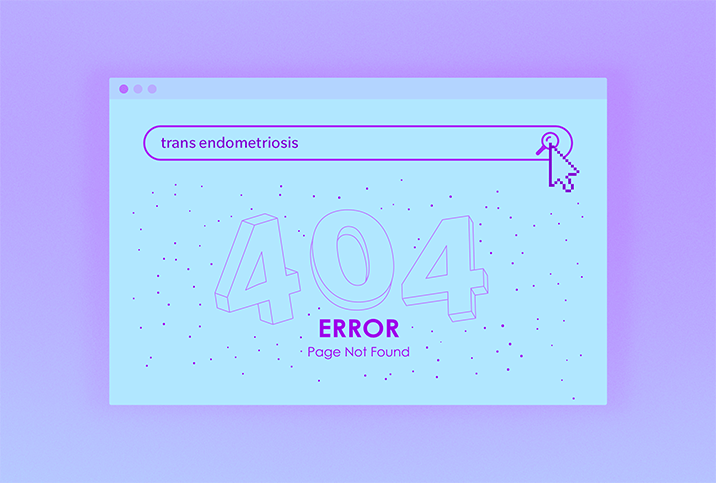The Hidden Struggle of Endo Belly

Endometriosis is associated with debilitating symptoms, such as heavy bleeding, intense cramping, chronic pain and infertility. One symptom that is less discussed but equally debilitating is severe bloating, also known as "endo belly" to sufferers.
Katherine Glyde is a menstrual well-being coach in London who was diagnosed with endometriosis in 2018 after experiencing symptoms, including bloating, for 17 years. Endometriosis occurs when endometrium-like tissue, similar to the inner lining of the uterus, instead grows outside the uterus on organs such as the ovaries or fallopian tubes.
"Initially, I was told I had IBS [irritable bowel syndrome], as the bloating and other gut health symptoms I was experiencing weren't considered to be related to my menstrual cycle at all," she said.
In time, she came to realize that the bloating was linked to endometriosis, and her condition caused the bloating to flare up at certain times in the month, particularly during ovulation.
What causes endometriosis-related bloating?
There is no known cause of endo belly, but there are some theories. Tara Scott, M.D., the medical director and founder of Revitalize, a wellness-focused medical platform based in Akron, Ohio, believes endo belly is caused by the effect of endometriosis on gastrointestinal function.
Glyde said that in her experience, hot weather, extreme fatigue, changes to diet and traveling can all trigger severe bloating.
It's important to keep track of your bloating by keeping a food and lifestyle diary alongside a period tracker. These tools can help you identify the key points in your menstrual cycle where the bloating improves or worsens and, hopefully, help you identify a pattern. Some people might find that when they eat gluten, dairy or sugar, the bloating worsens, so cutting these foods out or minimizing them could dramatically improve this symptom.
The link between endometriosis and IBS
Endometriosis is linked to other chronic health conditions, including chronic fatigue syndrome, fibromyalgia and irritable bowel syndrome (IBS).
"As the symptoms are similar, it can be difficult to diagnose if someone is suffering from IBS or endometriosis," said Hana Patel, M.B.B.S., a general practitioner in South London who specializes in women's health. "Endometriosis can affect the bowel and cause IBS-type symptoms. Women with endometriosis are two to three times more likely to also be diagnosed with IBS."
Although more research needs to be carried out, there does appear to be a link between the two conditions, with many of the symptoms overlapping. A small 2009 study published in the Journal of Obstetrics and Gynecology Canada involved 26 patients with endometriosis and 25 women without it. The study found a higher proportion of women with endometriosis experienced bloating: 96 percent compared with 64 percent of women without the condition.
"Endometriosis is now known as an inflammatory and immune process in the pelvis," Scott explained. Since the intestines are affected by the inflammation in the peritoneal fluid and can be involved in endometriosis (especially the colon, which is closer to the uterus), there is often a correlation between IBS and other gut issues and endometriosis. Endometriosis lesions or adhesions on the intestines could cause issues as well.
Another possible link is small intestinal bacterial overgrowth (SIBO), or too many bacteria in the small intestine. We know that endometriosis can affect the bowel due to inflammation and scarring, which can inhibit gut function and cause IBS-type symptoms, including bloating, gas and diarrhea. SIBO, a complex condition, can be diagnosed with a simple breath test requested by a healthcare professional, who may prescribe antibiotics to help clear the overgrowth and help your gut heal.
Treatment and prevention
Treatment is different for each individual, depending on the severity of the endo belly and how you identify your own personal triggers. Glyde finds that preparation is key: drinking water frequently, avoiding fizzy drinks and opting for peppermint tea can make a difference in how she feels. She also recommended staying active by walking, because movement can reduce bloating and have a positive impact on mental health.
CBD, Epsom salt baths, an acupressure mat and gentle stretching can also help improve the symptoms.
Patel recommended talking to your doctor to discuss treatment options. They may suggest hormonal treatment or, in more severe cases, surgery to cut away areas of endometrial tissue. These options can positively impact bloating, especially if you have endometriosis on the bowel. For patients who would rather treat this symptom without medication or surgery, Patel suggested physiotherapy and exercises like Pilates to help strengthen the pelvic floor muscles, reduce pain and possibly help with bloating, too.
Finally, Scott said an anti-inflammatory diet can be helpful in some cases. This diet would include consuming less red meat, alcohol and sugar and increasing intake of vegetables, fish and citrus fruit. As well as improving your diet, taking a probiotic or a medicinal tea may help.


















